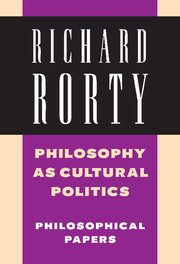Book contents
- Frontmatter
- Contents
- Preface
- Acknowledgments
- I RELIGION AND MORALITY FROM A PRAGMATIST POINT OF VIEW
- II PHILOSOPHY'S PLACE IN CULTURE
- 5 Grandeur, profundity, and finitude
- 6 Philosophy as a transitional genre
- 7 Pragmatism and romanticism
- 8 Analytic and conversational philosophy
- III CURRENT ISSUS WITHIN ANALYTIC PHILOSOPHY
- Index of names
8 - Analytic and conversational philosophy
Published online by Cambridge University Press: 05 June 2012
- Frontmatter
- Contents
- Preface
- Acknowledgments
- I RELIGION AND MORALITY FROM A PRAGMATIST POINT OF VIEW
- II PHILOSOPHY'S PLACE IN CULTURE
- 5 Grandeur, profundity, and finitude
- 6 Philosophy as a transitional genre
- 7 Pragmatism and romanticism
- 8 Analytic and conversational philosophy
- III CURRENT ISSUS WITHIN ANALYTIC PHILOSOPHY
- Index of names
Summary
The distinction between “analytic” and “continental” philosophy is very crude, but it does provide a rough-and-ready way to start sorting out the philosophy professors. To tell which pigeonhole to put a professor in, look at the books and journal issues on her shelves. If she has quite a lot of books by and about Hegel and Heidegger, and none by Davidson or Rawls, she will probably be content to be described as continental, or at least not to be described as analytic. If her desk is strewn with marked-up offprints from The Journal of Philosophy, The Philosophical Quarterly, and Philosophical Review, she can safely be typed as analytic.
Sometimes, however, you meet a philosophy professor who takes part in the debates conducted in those journals and also can discourse learnedly on, for example, the adequacy of Habermas' account of the motives for Heidegger's “turn.” Quite a few people, both Anglophones and non-Anglophones, can easily turn from Rawls to Carl Schmitt, or from Derrida to Wittgenstein, or from Foucault to Christine Korsgaard. But this ability is still confined to a relatively small fraction of the world's philosophers.
The main reason such ambidexterity is rare is that students trying to shape themselves into plausible job candidates for teaching positions in philosophy only have time to read so much. They can please only so many potential employers. In most European countries, candidates for such positions have to learn quite a lot of intellectual history before they go on the market.
- Type
- Chapter
- Information
- Philosophy as Cultural PoliticsPhilosophical Papers, pp. 120 - 130Publisher: Cambridge University PressPrint publication year: 2007
- 6
- Cited by



